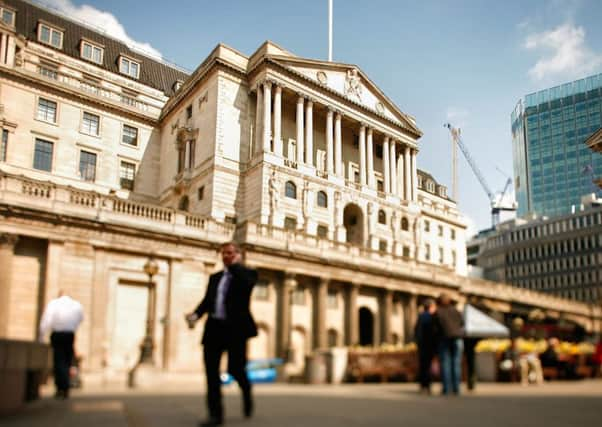Lenders to face foreign scenario in BoE stress test
This article contains affiliate links. We may earn a small commission on items purchased through this article, but that does not affect our editorial judgement.


It comes amid concerns the UK has become particularly vulnerable to global investor sentiment after sterling collapsed and bond yields soared in the wake of the Brexit vote.
“As highlighted in recent financial stability reports, the United Kingdom’s large current account deficit creates a vulnerability to a reduction in foreign investor appetite for UK assets and increases in funding costs for real-economy borrowers,” the Bank said.
Advertisement
Hide AdAdvertisement
Hide Ad“The 2017 cyclical scenario incorporates a sudden increase in the rate of return investors demand for holding sterling assets and an associated fall in sterling.”
The Bank will for the first time put lenders through two stress scenarios, which will separately test their ability to withstand pressures of ultra-low interest rates and rates rising towards 4 per cent.
The so-called “exploratory” scenario will incorporate “severe and synchronised” stress to both the British and global economy and financial markets, with weak growth, low interest rates, stagnant trade and cross-border banking activity.
It will also test whether lenders can face increased competition from smaller, challenger banks and further misconduct costs. The scenario will cover a seven-year period, with the results published in the fourth quarter of 2017.
The other scenario will raise interest rates towards 4 per cent and see house prices plunge 33 per cent in the UK, while a global and domestic recession sends economic growth rate spiralling by 4.7 per cent.
The annual stress test will examine the resilience of seven UK lending giants, including Barclays, HSBC, Lloyds Banking Group, Nationwide, Royal Bank of Scotland Group, Santander UK and Standard Chartered.
Advertisement
Hide AdAdvertisement
Hide AdRBS was last year forced to raise around £2 billion to boost its balance sheet after failing the Bank of England’s annual health check.
It is understood the main reason RBS failed the 2016 stress test was the threat of a huge fine for mis-selling of US mortgage securities, which some feared could climb as high as £12bn.
Barclays and Asian-focused player Standard Chartered also struggled in the test, but were deemed to have adequate plans in place and were not forced to take any further action.
• READ MORE: Central banks go separate ways on interest rates
The latest stress test scenarios were released just as the Bank’s financial policy committee (FPC) warned financial stability could be compromised as businesses start to adapt to Brexit conditions.
“Sudden adjustment could disrupt the provision of market liquidity and investment banking services, particularly to the EU real economy, which could spill back to the UK economy through trade and financial linkages,” the FPC said.
“Over a longer horizon, the FPC is alert to the potential for greater complexity in firms’ business structures to reduce the resilience of the UK financial system and is examining appropriate mitigants.”
The FPC said it now overseeing contingency plants to reduce financial stability risks as negotiations get under way. The committee also highlighted rising UK household debt, which is “high by historical levels” and could put lenders at risk if underwriting standards – which helps determine how much debt can be issued to a borrower – are weakened.
Advertisement
Hide AdAdvertisement
Hide AdWhile near-term prospects for the global economy have improved, the FPC said it was still wary of rising debt levels in China and rising borrowing costs for European governments amid weaker growth prospects.
It also threw up warnings over protectionist policies, noting greater uncertainty around support for global trade and international financial integration – which it said has not yet been fully priced into financial markets.